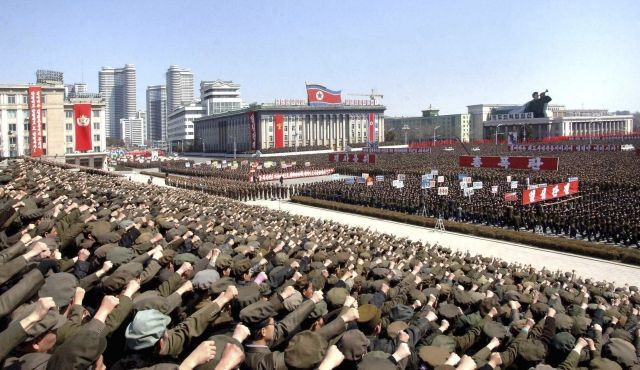UN Agency Detects Radiation In Japan Pointing At North Korea’s February Nuclear Test

A U.N. agency tasked with monitoring and investigating signs of nuclear explosions said on Tuesday that it has detected radioactive gases that could be linked to a test conducted by North Korea on Feb. 12.
The preparatory commission for the comprehensive nuclear-test ban treaty organization (CTBTO) said stations in Japan and Russia have picked up “significant” traces of noble gases that accompany a nuclear explosion, adding that it “could be attributed” to the North's test, the Associated Press news agency reported.
The detection was made at the radionuclide station in Takasaki, Japan, located at around 1,000 km (620 miles) from North Korea’s test site, the Vienna-based organization said in a statement. Lower levels were picked up at another station in Ussuriysk, Russia.
Two radioactive isotopes of the noble gas xenon were identified, xenon-131m and xenon-133, which provide reliable information on the nuclear nature of the source, the U.N. agency said.
Radioactive xenon from a well-contained underground nuclear explosion seeps through layers of rock, escapes into the atmosphere and can later be detected thousands of kilometers away.
“We are in the process of eliminating other possible sources that could explain the observations; the radionuclides could have come from a nuclear reactor or other nuclear activity under certain specific conditions, but so far we do not have information on such a release,” CTBTO radionuclide expert Mika Nikkinen said.
Radionuclide monitoring is used to detect radioactive particles and noble gases in the atmosphere and is the only technology that can confirm whether an explosion is indicative of a nuclear test.
The CTBTO is the U.N. organization responsible for ensuring that no nuclear explosion goes undetected and the radionuclide technology provides the means to identify the “smoking gun” needed to prove a possible violation of the Comprehensive Nuclear-Test-Ban Treaty (CTBT).
On Feb. 12, Pyongyang’s nuclear test was detected by 94 seismic stations and two infrasound stations of the CTBTO’s International Monitoring System. The first data were made available to CTBTO Member States in a little more than one hour, and before North Korea announced that it had conducted a nuclear test.
Meanwhile, North Korea insisted that it be recognized as a nuclear weapons state, a demand the U.S. dismissed as “neither realistic nor acceptable,” Reuters news agency reported.
"If the DPRK (North Korea) sits at a table with the U.S., it has to be a dialogue between nuclear weapons states, not one side forcing the other to dismantle nuclear weapons," Pyongyang’s official Rodong Sinmun newspaper said.
Thomas Countryman, U.S. assistant secretary for international security and non-proliferation, who is in Geneva for talks on the nuclear Non-Proliferation Treaty (NPT) said: “It is important that the world respond calmly but deliberately without changing our emphasis that the goal of the world to which North Korea is committed is a denuclearized Korean peninsula.”
“And the more states that make that clear, the greater the chance we have of arriving at exactly that goal,” he was quoted as saying by the Reuters news agency.
© Copyright IBTimes 2024. All rights reserved.






















